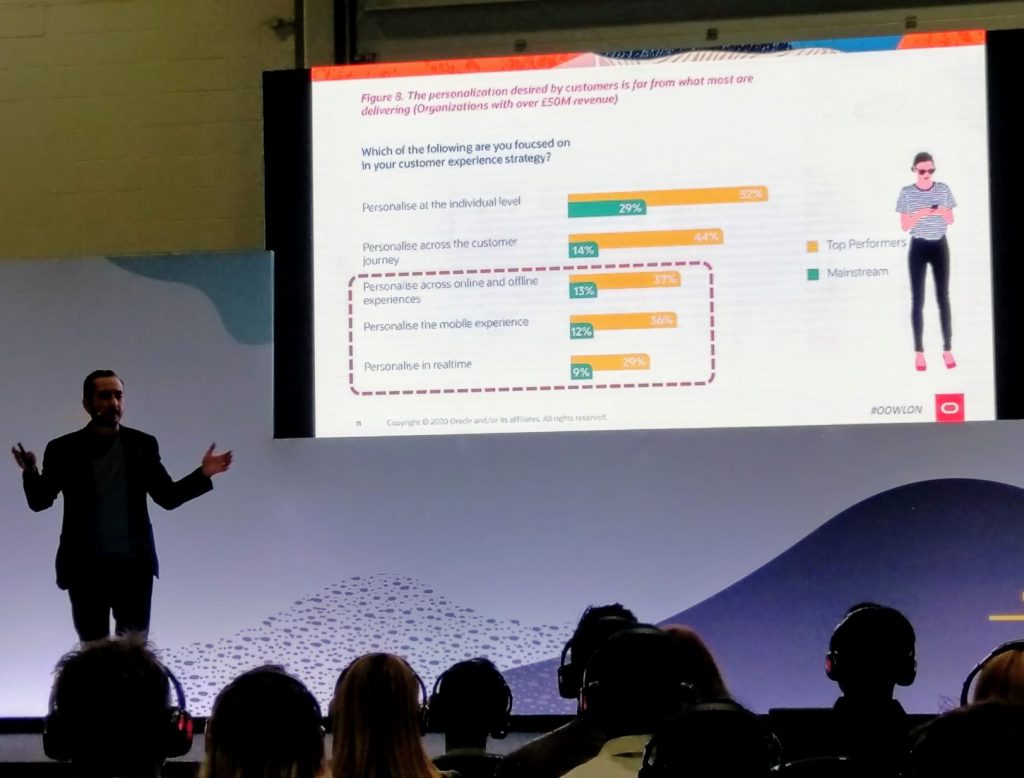After my three longer articles from the Oracle Openworld in London (chat bots, cloud applications, customization in the times of cloud applications), I want to share some more insights from the conference about various, smaller topics.

Oracle fights for its database business – and degrades Machine Learning and Bitcoin Technologies to commodities
Oracle jumped very late on the cloud train and opened a Swiss cloud data center just some months ago. This does not come to a surprise. Oracle generates high revenues with its licenses for on-prem database technology, thus, they have a lot to lose. However, with so many new and cheaper offerings – opensource software and/or cloud services from other cloud service providers, I was wondering how Oracle wants to survive. In London, Oracle gave an impressive answer. Juan Loaiza presented about Oracles database / data management strategy. My main learnings were:
- Oracle pushes the “one database for all purposes” concept. Key value, XML, relational databases, data streams – an Oracle database is the solution for all your needs.
- Oracle integrates deeply spatial data processing, social graph analytics, IoT, Json, Machine Learning (ML)/AI, Blockchain algorithms and technologies in their database. They are for free – if you use and license an Oracle database.
When looking at this from a business strategy perspective, Oracle increase the value of their database for their customers. At the same time, we see a further commoditization of technology buildings blocks and algorithms in “hot areas” such as Blockchain or Machine Learning, in which many newly founded companies are trying to find their niche.

Digital Assistants are for real
While I discussed about the marketing values of chat bots in a previous article, I want to have a short look at chatbots for company internal usage. Chatbots and digital assistants are big, that’s Oracle’s message. Ian Wallis shared in his speech “elevating employee experience with digital assistants” that…
- In 2022 70% of the office workers will interact daily with chatbots.
- Oracle plans to add chatbots to more or less all its SaaS offerings. Oracle HCM is at the forefront.
- It is really a statement to deliver a software and tell your customers that you can use the chat bot (if you use a standard Oracle HCM installation) without specific machine learning training and you are in production within a week
- Oracle offers digital assistants as an feature for which customers need an add-on license. So, it seems this is an obvious business case and Oracle believes companies are willing to spend money.
Just for clarification: Oracle uses the term “Digital Assistant” as a kind of coordinator who invokes the chatbot being the right one for a certain topic. These chatbots are called “skills”.

Emotional Economy & IT
Technology and emotions, that’s a new combination, but at the heart of Amr Elrawi’s presentation “2020 Marketing Trends – Improve Customer Experience & Drive Commercial Value”. He ponted out that we are in the time of an experience economy. The product is not relevant (or: not a distinguishing factor). It is all about the experience. Plus, if customers by your product for emotional reasons, they are willing to pay more than they buy it for features.
On a technology side, this requires “B2Me” – personalized experience in real time. The example discussed was Burger King using the app to push ads to their customers when they were close to a Mc Donald’s to lure them away.

Chatbot Success Tips
Grant Ronald presented “Top Tips for Building Great Digital Assistants and Chatbots”. Some of the tips are obvious – make sure to have a business case, do not focus too much on technical brilliance (e.g., regarding natural language processing), but on the users. Then, there were a few tips that address also the emotional level Amr Elrawi was taking about. It seems that usability and design are still needed, but that it is not enough anymore. Here his emotions-related tips:
- A chatbot mimics a conversation, not a form. Conversations should be designed like natural conversations. Also think what kind of context information you can derive, e.g., by knowing with whom you talk respectively in which context he/she might be in. Also, if users do not provide the right information, lead him/her back on the right track. Do not frustrate users with repeating the same question they did not have an answer for you asked them the first time.
- Consider working out a chatbot personality. Maybe give the bot a name and a persona. What is the right voice and terminology to meet this persona? A chatbot should not sound like a Victorian grandfather.
- Enable the chatbot to handle Smalltalk (“Are you a bot?” “What’s the weather?” “How are the football results?”). At the same time, bring the user back to the main point or service why you invested in the chatbot, e.g., to let her/him order what you want to sell.
- Ensure that the bot can communicate what services he can offer to prevent disappointment. A chatbot cannot provide everything from the beginning, but if you check the log files what the users wanted to use the chat bot for, this can give you some hints what the chatbot could include in the next release.
- You have to notice and be able to deal with if a customer is upset, e.g., because she/he starts swearing. One option is offering to hand over the communication to a human agent.
It looks like we are moving towards a world where computers have to deal with human emotions as well. Exiting times! At the same time, this is the end of my fourth and last article about the 2020 London Oracle Openworld conference.

First posted 16.2.2016
All my Oracle Openworld London 2020 artictles:
- Oracle Openworld Learning 1: Moving your applications to the cloud and moving to a cloud application is something completely different
- Oracle Openworld Learning 2: How the Cloud impacts the Software Customization Business
- Oracle Openworld Learning 3: The True Value of Chatbots
- Oracle Openworld Learning 4: The Oracle Database, ML, and Bitcoin – plus how Computer and Emotions come together